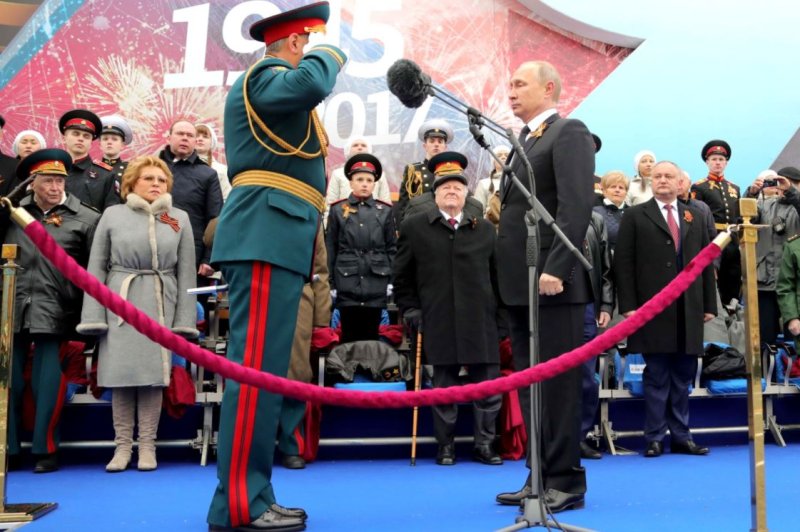Russian President Vladimir Putin meets troops at the Russian military parade marking the 72nd anniversary of Victory in the 1941–45 Great Patriotic War in Red Square, Moscow on Tuesday. Photo courtesy of the Kremlin
I just returned from a week in Moscow to attend the 6th annual Moscow International Security Conference and a second one sponsored by ISKRAN, Carnegie and the Gorchakov Foundation in Moscow.
The public and private discussions concerning the West, United States and Russia were more somber and sobering and in many ways the most inflexible I have witnessed since the end of the Cold War. All the senior Russians had virtually the same message: The United States was actively hostile to Russia and the primary source of the crises today from the Middle East to NATO that have sent relations to a "catastrophic" low level.
These charges are not new. But compared with last year's conference, the tone and substance of Russia's alleged grievances were far more negative. Even with close Russian colleagues, trying to reach some accommodation or grounds for rebuilding confidence and reducing tensions seemed almost as impossible or distant as Democrats and Republicans establishing a detente (or cease-fire) in Congress.
When posed with these two challenges, the responses uniformly reflected a combination of denial and disbelief. First, if there was irrefutable evidence of Syria employing (and still keeping supplies of) sarin gas, would that change your thinking and Russian policy? Second, if there were irrefutable evidence of Russian interference in U.S. and other elections and political processes, would that change Russian thinking? Hell nyet was the stinging answer.
Much of Russian Gen. Valery Gerasimov's unclassified briefing to the MISC on Russian military strategy was as alarming. Gerasimov, chief of the general staff of the Russian Armed Forces, blamed NATO and the United States for precipitating tensions with Moscow. Further, the general greatly exaggerated NATO's military capability and argued that what NATO considered as modest increases in military presence and a more robust series of military exercises were direct threats against Russia. He also wrongly implied that Supreme Allied Commander had the authority to deploy forces and hence start a war. And he further perceived U.S. Cyber Command as solely directed against Russia.
This is not, however, just Russian paranoia. Current U.S. military strategy is based on the so-called "4 plus 1" matrix and the requirement to deter and if war comes defeat Russia or China or Iraq or North Korea while battling the Islamic State and other jihadi groups. Thus, it is understandable that the Russian military would take this American declaration of intent with the utmost seriousness. That said, Gerasimov's talk ended on a very positive and optimistic note.
The general was not necessarily pleading for, but was surely very intent on, re-establishing a military-to- military dialogue with the United States and the West on common interests such as defeating terror and preserving arms control agreements. Whether this call for dialogue will be heard in Washington is another matter. Only a small number of the nearly 800 attendees were Americans and each was a private citizen. While the U.S. Embassy in Moscow had a few "observers" present, the absence of senior American government officials was not helpful in trying to improve relations.
At the second conference attended by very senior Russian officials and four former (as well as the current) U.S. ambassadors to Russia in Lenin's terms of "what is to be done?" did not evoke a great deal of positive ideas. Regarding the forthcoming July summit between presidents, the debate was between taking small steps in a low-risk, low-outcome meeting or seeking a broader and grander bargain, which would be high-risk, high-payoff. It was also clear that despite the competence of the Trump administration's national security team, none had any experience in dealing with arms control and security issues directly regarding Russia. One wag drove this point home by comparing the last U.S. Secretary of Energy (an eminent nuclear physicist with huge experience in these areas) and the current secretary.
Obviously, re-establishing dialogue on finding new confidence-building measures is essential. Yet, given that virtually all members of Congress see Russia as an adversary, if not enemy, could any administration overcome this domestic reality and advance relations with Moscow? Perhaps then, the best that can be achieved is to do no more harm. More likely, the relationship could worsen.
The costs will be in the failure to exploit the opportunities where our interests are common. The tensions and differences could spread, if not like cancer, certainly like a bad case of the flu to infect the healthier or least confrontational issues -- a grim but sadly objective conclusion drawn from attending these conferences.
Harlan Ullman has served on the Senior Advisory Group for Supreme Allied Commander Europe (2004-16) and is a senior adviser at Washington, D.C.'s Atlantic Council and Business Executives for National Security, chairman of two private companies and principal author of the doctrine of shock and awe. His next book, due out this year, is "Anatomy of Failure: Why America Loses Wars It Starts," which argues failure to know and to understand the circumstances in which force is used guarantees failure. Follow him on Twitter @harlankullman.















